Is the shampoo you’re using truly the best choice for your cat’s delicate skin? What works for one feline might not work for another. Discover which cat shampoo will keep your pet’s skin clean, calm, and comfortable—no matter their unique needs!
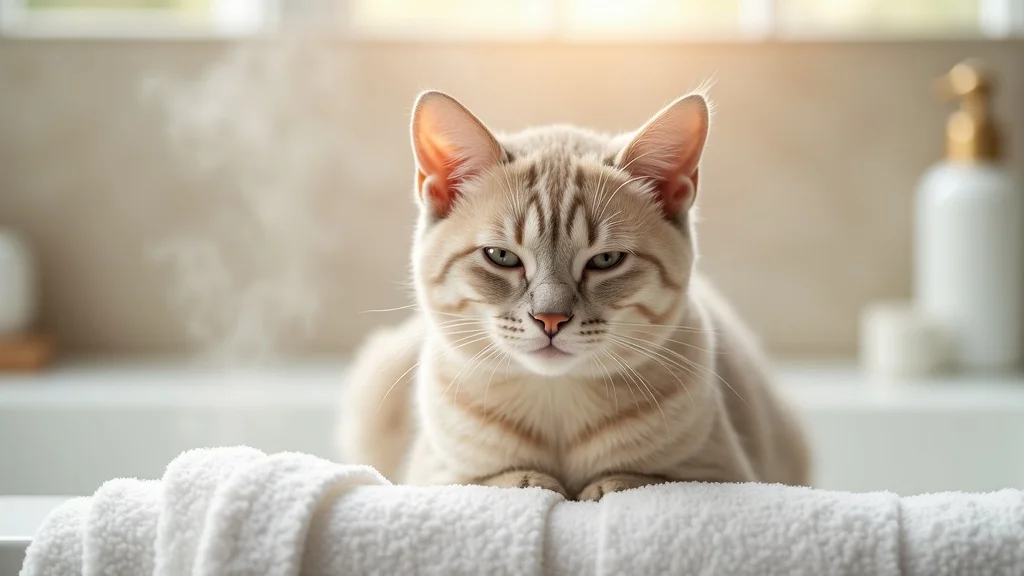
Curiosity Unleashed: Is There Really a ‘Best’ Cat Shampoo for Every Feline Skin Type?
When searching for what is the best shampoo for my cat’s skin type, many cat parents worry: Is there truly a one-size-fits-all answer? Unlike with human products, the answer is almost always “no.” Cats vary just as much as people do. Their skin and coats come in all sorts of types—dry, oily, sensitive, normal, and even those prone to allergies or irritation. The right cat shampoo does more than clean; it helps protect their skin barrier, soothe itchy skin, and maintain their natural oils while keeping their health and comfort a top priority.
In this comprehensive guide, you’ll uncover the truths about selecting the best cat shampoos for each skin type. From understanding why human shampoo is a bad idea to learning about the benefits of natural ingredients like aloe vera and shea butter, you’ll have everything you need to pamper your feline friend safely. Plus, we’ll answer the most common questions and show you how to read customer reviews for trustworthy feedback. Ready to find a good cat shampoo for your unique companion? Let’s dive in.
Understanding What Is the Best Shampoo for My Cat’s Skin Type
Choosing the best shampoo for your cat’s skin type means looking closely at their needs. Every cat’s skin and coat is different—what soothes one could irritate another. The most important factor in selecting shampoo for cats is understanding your pet’s particular issues: Does your cat have dry, flaky skin? Is their fur greasy or limp? Are they sensitive or showing signs of mild allergies like redness or itching? Or perhaps your feline deals with recurring skin conditions like fungal infections or fleabite allergies. If you misjudge their needs, you risk making things worse, with the wrong shampoo stripping vital oils or introducing harsh chemicals.
The best cat shampoos are specifically formulated for feline skin, keeping their pH level in balance, avoiding irritants, and supporting the skin barrier that protects them. Some common and safe ingredients to look for in a good cat shampoo include oatmeal, coconut, aloe vera, and shea butter. These provide moisture and comfort without introducing harmful substances. Understanding your cat’s specific skin condition is the first step toward healthier, happier skin and fur, setting your pet up for purrs and cuddles post bath!
What You’ll Learn: Making Sense of Cat Shampoo Choices
- How to recognize your cat's skin type
- Essential ingredients in shampoo for cats
- Why ‘human shampoo’ doesn’t work for felines
- Natural ingredients versus harsh chemicals
- How fleas, fungal infections, and sensitive skin affect your decisions
- Tips on reading customer reviews for the best cat shampoo
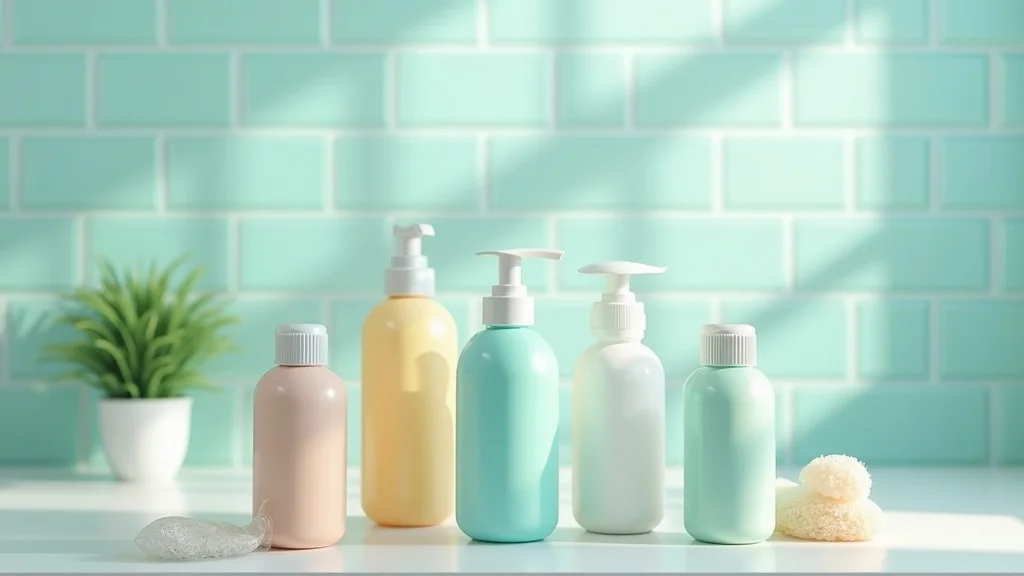
Decoding Feline Skin Types: The Foundation of Selecting the Best Cat Shampoos
The secret to finding what is the best shampoo for my cat’s skin type starts with learning your cat’s skin’s subtle signals. Cats, just like humans, can have dry skin, oily skin, or sensitive skin, alongside normal or allergy-prone types. If your cat is scratching more than usual, has flaky skin, or their coat looks dull, these are red flags worth addressing. On the flip side, an overly shiny or greasy coat can mean their natural oil balance is off, requiring a different approach to washing and maintenance.
Addressing each skin type means tackling the underlying causes. For example, dry skin can result from too-frequent bathing or harsh weather; sensitive skin could mean your cat is reacting to environmental allergies, household cleaners, or even their food. If you notice scabs, bald spots, or open sores, or if the itching doesn’t stop with an at-home fix, always consult your veterinarian, as these may signal deeper skin infections or allergic reactions needing professional care.
Identifying Cat Skin Types (Dry, Oily, Sensitive, Normal, Allergic)
- Physical signs and symptoms: Look for flaking, oiliness, redness, or hair loss.
- Common skin problems in cats: These include itchy skin, dandruff, scaly patches, or an unpleasant odor.
- When to seek veterinary advice: Persistent sores, swelling, or sudden changes in your cat’s skin or coat mean it's a good idea to see your vet promptly.
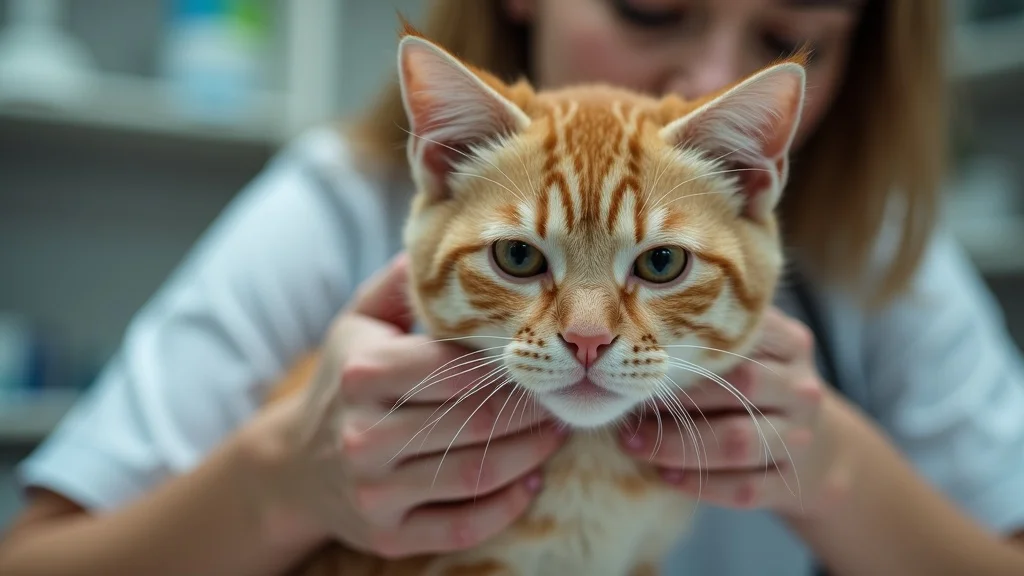
How What Is the Best Shampoo for My Cat’s Skin Type Changes With Each Unique Need
Choosing cat shampoos for a dry-skinned cat is different than for one with oily or normal skin. For dry skin, opt for shampoos specifically formulated with moisturizing ingredients like oatmeal or shea butter. If your cat's skin is oily, you'll want balanced formulas that cleanse without stripping away essential natural oils. Sensitive skin requires hypoallergenic and fragrance-free options, ideally with natural ingredients and zero harsh chemicals. Allergic or irritated skin calls for medicated shampoos that address underlying causes such as bacterial or fungal infections, often on a veterinarian's advice.
Remember: as the seasons change or your cat’s environment shifts, their skin needs can change, too. Keep an eye out for new symptoms and always transition to a new product gradually—testing in a small area first for any negative reaction.
What Is the Best Shampoo for My Cat’s Skin Type? Exploring Shampoo and Conditioner Options
Let’s take a closer look at the top-rated shampoo and conditioner choices designed for each feline skin type. Not every cat shampoo is created equal, and your furry friend’s comfort depends on using products built for their unique needs. From deep hydration with natural oils to balanced cleansers supporting both fur and skin health, making the right selection ensures hassle-free grooming and a happier, healthier cat.
Below, we'll highlight dry skin formulas, sensitive skin hypoallergenic blends, options for itchy skin relief, and versatile maintenance shampoos safe for regular use. Each is designed for a specific skin type and addresses problems like skin infection, fungal troubles, and more, making your search easy and your bath times less stressful.
Top-Rated Cat Shampoo and Conditioner Choices for Each Skin Type
- Dry skin: Seek oatmeal, aloe vera, or shea butter. Look for ultra-hydrating products to avoid stripping your cat's natural oils.
- Oily skin: Balanced formulas that delicately remove excess oil without drying out fur and skin are ideal.
- Sensitive skin: Hypoallergenic, unscented options with minimal, soothing ingredients protect delicate skin barriers.
- Normal skin: Maintenance shampoos with mild cleansers maintain health without unnecessary additives.
- Allergic or irritated skin: Choose medicated options for conditions like persistent itching or fungal infection, under vet guidance.

| Skin Type | Recommended Ingredients | Product Features | Example Use |
|---|---|---|---|
| Dry Skin | Oatmeal, aloe vera, shea butter | Moisturizing, itch relief, gentle formula | Reduces flaking, hydrates fur and skin |
| Oily Skin | Balanced cleansers, gentle botanicals | Removes grease, supports healthy skin barrier | Balances oil, leaves coat shiny |
| Sensitive Skin | Hypoallergenic, fragrance-free, minimal ingredients | Soothes allergies, prevents irritation | Comfort for cats with allergies or sensitivities |
| Normal Skin | Mild cleansers, light botanicals | General maintenance, gentle cleanse | Healthy coat, easy to rinse |
| Allergic/Irritated | Medicated (vet-approved), antifungal, antibacterial | Treats skin infections and severe itch | Relieves skin infections, soothes inflammation |
Understanding Ingredients: Natural Ingredients, Harsh Chemicals, and Why They Matter
- Natural vs. synthetic: Natural ingredients like aloe vera and oatmeal promote healing and soothe irritation, while synthetic additives can trigger allergies in sensitive felines.
- Benefits of natural ingredients in cat shampoo: They moisturize the skin, maintain the skin barrier, and reduce the risk of flare-ups from skin conditions or allergies.
- Dangers of harsh chemicals: Sulfates, artificial dyes, and some preservatives can cause dryness and skin infections, particularly on sensitive skin.
“Always read the label—what you put on your cat’s skin is just as important as what goes in their food.” – Feline Dermatology Specialist
Common Concerns: What Is the Best Cat Shampoo When Dealing With Special Issues
When your cat faces specific problems like itchy skin, fungal infection, or rampant fleas, choosing the right cat shampoo becomes even more critical. Poorly matched products can worsen skin infections or allow parasites to stick around, so targeting your cat’s symptoms with shampoos specifically formulated for these concerns is the safest route.
Always read reviews, check labels for veterinary approval, and avoid products with harsh chemicals that might irritate already compromised skin. Some medicated shampoos are safe for long-term use, but others—especially flea shampoos—may require careful timing to avoid overexposure.
What Is the Best Shampoo for My Cat’s Skin Type With Itchy Skin, Fungal Infections, or Fleas
- Signs of itchy skin and fungal infections: Scratching, hair loss, scabs, and odor.
- Flea shampoo: safety and efficacy: Look for formulas specifically tested on cats, always following dosage instructions to avoid toxicity.
- When medicated cat shampoos are necessary: Use these when your vet recommends, particularly for stubborn skin infections or persistent itch relief.
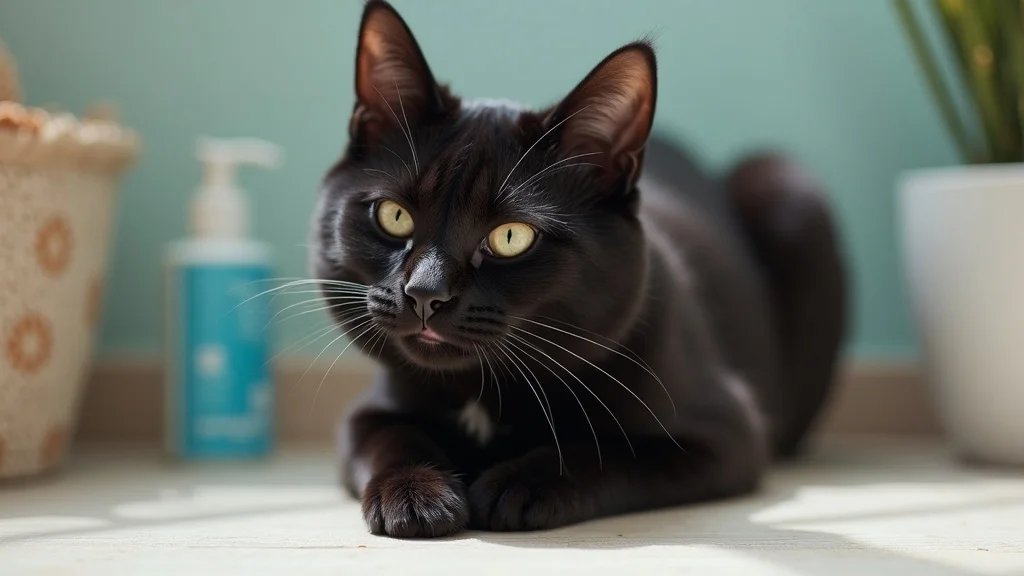
“Choosing a good cat shampoo is about matching the product to both your cat’s needs and your household’s priorities.” – Pet Care Expert
Can I Use Human Shampoo on My Cat?
- pH balance differences: Human skin is more acidic, while cats need a neutral or slightly alkaline shampoo. Using human shampoo disrupts the natural cat skin barrier, leading to dryness or irritation.
- Risks associated with human shampoo ingredients: Fragrances, sulfates, and other additives are harsh on feline skin and may cause allergic reactions or worsen skin conditions. Stick with shampoo for cats to ensure safety.
How to Bathe a Cat With Skin Problems: Step-by-Step Guide
Bath time doesn’t have to be stressful for you or your feline companion, especially if you’re armed with safe, gentle products and a clear plan. Here’s the best practice for bathing your cat if they have skin sensitivities or problems. Preparing properly, using the best shampoo for your cat’s skin type, and gentle aftercare helps soothe issues and prevents future flare-ups.

Preparing the Bath: Supplies and Safe Environment
Start by gathering everything you need: a bottle of cat shampoo matched to your pet’s skin type, soft towels, a non-slip mat, a refillable pitcher or sprayer, and some treats for calm and reward. Choose a small room (like a warm bathroom) where your cat can’t escape and slip. If possible, ask a helper for an extra pair of hands to keep your pet steady and reassured.
Test the water to ensure it’s lukewarm—not hot or cold. Prepare everything within arm’s reach before you bring your cat in. It’s a good idea to trim their nails beforehand as well, helping everyone stay safe during the process. Place your feline in the tub or sink gently and talk calmly to reduce anxiety.
Bathing Techniques: Applying What Is the Best Shampoo for My Cat’s Skin Type
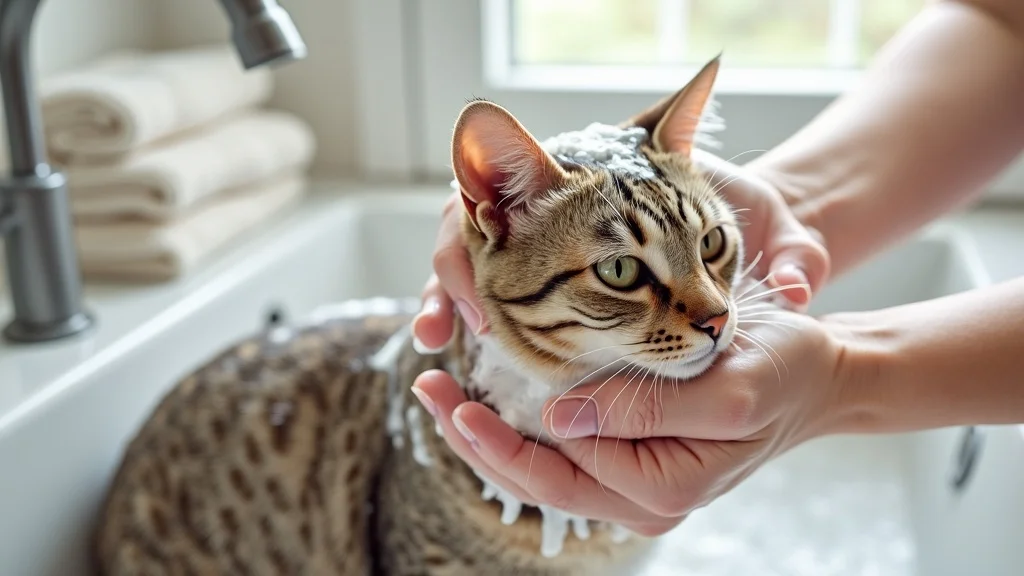
Wet your cat’s coat with gentle, steady streams of water. Avoid the eyes, ears, and nose area—these are sensitive and should only be wiped with a damp cloth. Apply a small amount of shampoo for cats along the back, then massage it through the fur and skin using your fingertips. This helps lift debris, dirt, and soothe the skin barrier. For itchy skin or skin infections, let the lather sit for a minute or two (per label instructions), then rinse thoroughly with fresh water. Residue can worsen irritation, so double-check your work.
After rinsing all the shampoo out, gently pat your cat dry with a soft towel. Keep the room warm as they dry to avoid chills. Reward them with a treat and a soothing voice—positive associations make future baths much easier.
Aftercare: Post-bath Grooming and Monitoring Your Cat’s Skin
Following a bath, gently comb out your cat’s fur and watch for signs of irritation over the next 24 hours. Redness, constant grooming, or excessive scratching might mean a poor product match or missed rinsing. For ongoing skin conditions, keep track of how their skin responds to a new shampoo and adjust future choices as needed.
A little observation goes a long way: if you see improvement—less scratching, shinier coat, or reduced odor—your chosen cat shampoo is working just as intended.
Review Roundup: Customer Reviews and Expert Opinions on the Best Cat Shampoo
With so many options available, sifting through customer reviews and expert ratings can help you make a confident choice. Look for consistent themes in the feedback: does the product improve itch relief, is it easy to rinse, and are cats tolerating it well? Double-check if reviewers mention positive changes for specific skin concerns—like reduction in dandruff, less biting or scratching, and a glossier coat.
Where to Find Reliable Reviews for Cat Shampoos
Search trusted websites like veterinary clinics, large pet supply stores, and well-known pet parent forums. Reviews on large retail sites provide an overview, but expert blogs or veterinarian recommendations offer critical insight into which ingredients, brands, or formulas are most respected. Cross-reference highly rated shampoos against ingredient lists to ensure your pick is safe and effective.
How to Interpret Customer Reviews and Expert Ratings
Look for patterns: shampoos with repeated praise for resolving itchy skin, improving dull fur, or being tolerated by cats with sensitive skin are typically safer bets. On the flip side, multiple complaints about harsh odors, poor packaging, or side effects mean it’s a good idea to avoid those options. Prioritize actual customer experience over slick marketing claims.
| Product Type | Pros | Cons |
|---|---|---|
| Hydrating (for Dry Skin) | Moisturizes; reduces flaking; minimal scent | Sometimes difficult to rinse fully |
| Sensitive/Hypoallergenic | No harsh chemicals; very gentle | Less lather; higher price tag |
| Medicated (for Allergies/Fungus) | Kills bacteria & fungus; clears irritation | Some cats dislike scent; requires prescription |
| Flea Shampoo | Effective for flea removal | Can be drying if overused |
| Maintenance (Normal Coat) | Leaves coat shiny; easy to use | May not help severe conditions |
Visual Guide: How to Bathe a Cat With Skin Sensitivities
Watch a step-by-step demonstration on bathing cats with sensitive skin: [Video Not Available in HTML Sample]
Lists: Best Shampoo for Cats—Top 5 Products by Category
- Best for Dry Skin: Ultra-moisturizing oatmeal and aloe cat shampoo
- Best for Sensitive Skin: Hypoallergenic, soap-free cat shampoo
- Best Flea Shampoo for Cats: Fast-acting, cat-safe flea shampoo formula
- Best Natural Ingredient Cat Shampoo: Botanical blend with coconut, shea butter, and aloe
- Best Overall Shampoo and Conditioner Combination: Dual-action formula for shine and skin health
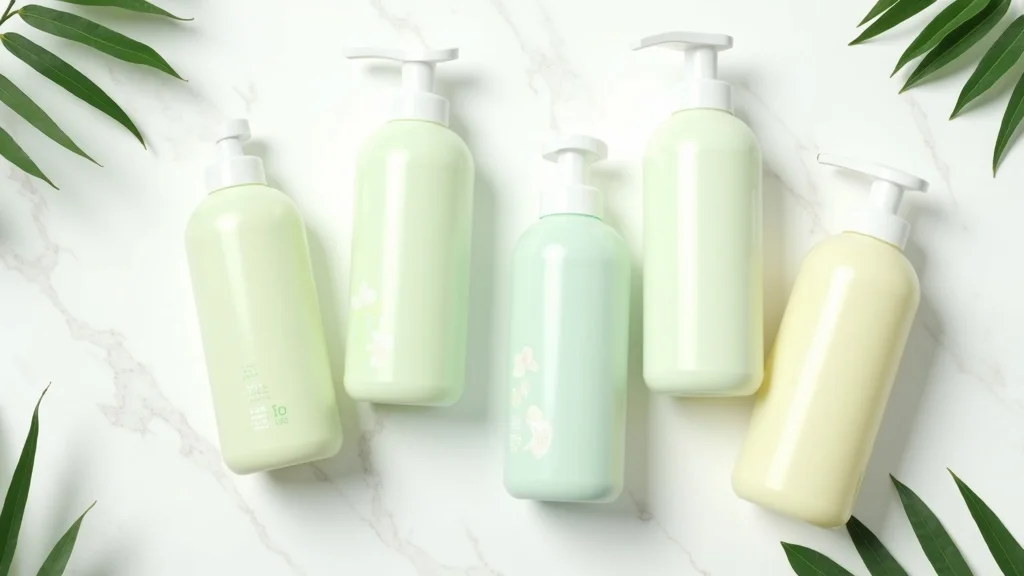
Hear veterinary advice on choosing, using, and rinsing cat shampoo for different skin conditions: [Video Not Available in HTML Sample]
FAQs—Answers to Your Questions About What Is the Best Shampoo for My Cat’s Skin Type
What is the best cat shampoo for irritated skin?
The best cat shampoo for irritated skin is a hypoallergenic, fragrance-free formula containing soothing ingredients like oatmeal, aloe vera, or coconut oil. These ingredients calm redness, support the skin barrier, and offer reliable itch relief—especially important for cats with allergies or who react to harsh chemicals. Check that the product is specifically formulated for felines and always consult your vet for persistent or severe irritation.
How to bathe a cat with skin problems?
Use lukewarm water, shampoo for cats that matches their unique skin type, and gentle, slow motions. Avoid scrubbing. Rinse thoroughly to remove all residue, as leftover product can worsen skin conditions. Afterward, dry your pet gently and monitor for any negative reactions. If you’re unsure about which shampoo is right, seek advice from your veterinarian about specific shampoos for your feline’s challenge.
What is the gentlest cat shampoo?
The gentlest cat shampoo will be hypoallergenic, soap-free, dye-free, and formulated for sensitive skin. Look for natural ingredients like oatmeal and coconut, and double-check labels for “for cats only.” Such products avoid harsh chemicals and keep the ph balance right for your cat’s skin and coat.
What is the best thing to bathe a cat in?
Always use warm (not hot) water and a tub or sink with a non-slip base. Bathe your cat only in products that are specifically formulated for cats—human shampoos or dog products are too harsh for your feline’s delicate skin barrier. When in doubt, talk to your veterinarian about the best products and environment for your unique pet.
Key Takeaways: What You Should Remember About What Is the Best Shampoo for My Cat’s Skin Type
- Always match the shampoo to your cat’s skin type.
- Check for natural ingredients and avoid harsh chemicals.
- Consult your vet for persistent or severe skin conditions.
Want more tips, stories, and pet care guides delivered straight to your inbox? Join our monthly PawPress newsletter and stay in the loop with the latest for your furry friends. 🐾 Subscribe now — your pets will thank you! https://pawpressnews.com
A safe, healthy cat starts with the right cat shampoo for their unique skin type. Choose wisely, read the label, and when in doubt, trust your veterinarian!
Selecting the right shampoo for your cat’s specific skin type is essential for maintaining their health and comfort. For cats with sensitive skin, the Earthbath Hypo-Allergenic Shampoo is highly recommended. This unscented, plant-based shampoo gently cleanses and soothes your cat’s skin, making it ideal for regular bathing and managing skin allergies or sensitivities. (businessinsider.com)
For cats with dry skin, the Jungle Pet Aloe & Oatmeal Shampoo offers a moisturizing solution. Formulated with aloe, oatmeal, and other natural ingredients, this shampoo helps rehydrate your cat’s skin, leaving their coat soft, shiny, and smelling clean. (dailypaws.com)
If your cat has oily skin, the Petway Petcare Cat Shampoo is a suitable choice. Made with plant extract-based ingredients, this deep-cleansing shampoo effectively removes excess oils while maintaining your cat’s natural skin balance. (dailypaws.com)
For cats with normal skin, the Burt’s Bees Hypoallergenic Cat Shampoo is a gentle option. This shampoo cleans and softens your cat’s fur using high-quality ingredients, making it suitable for regular use. (mylisting.petwithit.com)
For cats dealing with allergies or irritated skin, the Veterinary Formula Clinical Care Hypoallergenic Shampoo is recommended. This gentle, tearless formula is designed to soothe sensitive skin and prevent irritation, making it ideal for cats prone to allergies. (dailypaws.com)
By choosing a shampoo tailored to your cat’s specific skin needs, you can ensure their coat remains healthy and comfortable.
 Add Row
Add Row  Add
Add 




Write A Comment